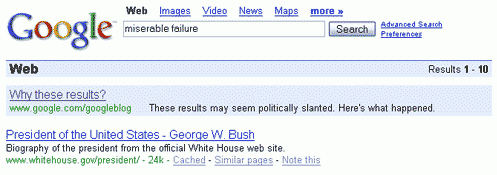
Other examples of Googlebombs: [talentless hack], [liar] for Tony Blair, [French military victories] who returns this top result.
Google's official reaction was: "We don't condone the practice of googlebombing, or any other action that seeks to affect the integrity of our search results, but we're also reluctant to alter our results by hand in order to prevent such items from showing up. Pranks like this may be distracting to some, but they don't affect the overall quality of our search service, whose objectivity, as always, remains the core of our mission."
But it seems that Google received too many complaints to continue to ignore this problem and from now on we won't see too many Googlebombs, as Google updated their algorithms for these special cases. "By improving our analysis of the link structure of the web, Google has begun minimizing the impact of many Googlebombs. Now we will typically return commentary, discussions, and articles about the Googlebombs instead." That means we won't see too many famous Googlebombs (French military victories still works, but miserable failure doesn't work anymore).
It's very hard to guess someone's intention when linking to a site: maybe he wants to plant a Google bomb, maybe he was paid to include a text link ad, maybe someone spammed the site and placed links to his "pharmaceutical" sites, maybe he linked to a site and that site changed its topic, maybe that link was included in the template of the site or maybe he made a mistake when typing the URL. Google tries to discover unnatural links (for example, they aren't about the topic of the site) and reduces their effect.
Most likely, the new algorithm tries to guess if a query was Googlebombed and biases the search results toward pages that talk about the Googlebomb. But this won't work for new Googlebombs because no news site talks about them before they're actually effective, so I think we'll see more people trying to defeat Google's algorithm and place their Googlebomb in these restrictive conditions.
No comments:
Post a Comment